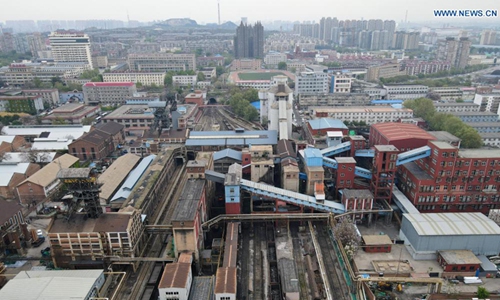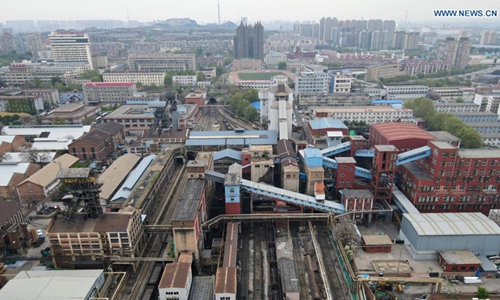
Aerial photo taken on April 26, 2021 shows the Kailuan coal mine in Tangshan City, North China's Hebei Province. Photo: Xinhua
China's top economic planner, the National Development and Reform Commission (NDRC), announced on Tuesday that it had reduced the number of days of coal supplies that power plants across the country must maintain during peak power use periods, in order to stabilize surging coal prices.
In a notice on its official website, the NDRC ordered power plants to cap coal inventories at no more than 12 days, from the 15-day level that was set in 2018.
The NDRC also ordered power plants to keep enough coal on hand for at least seven days of consumption to ensure power generation.
An insider at a power plant in North China's Inner Mongolia Autonomous Region told the Global Times that despite the basic requirement of a seven-day inventory for security, the plant usually stocks coal for around 10 days of consumption during some seasonal peaks such as winter, because the coal mines are also affected by the weather.
Lin Boqiang, director of the China Center for Energy Economics Research at Xiamen University, told the Global Times on Tuesday that apart from electricity demand driven by economic growth and seasonal power usage peaks, power plants' coal storage also plays an important part in coal price fluctuations.
"The cap on inventories can ease the power plants' pressure of daily operations, and it can also reduce surging domestic coal prices," said Lin.
The NDRC said the adjustment of coal storage days has vital meaning for coal inventories, stabilization of domestic coal prices and securing the country's power supply. The NDRC appealed to power plants to store more coal in low seasons for use in peak seasons, to cope with coal and electricity prices, and coordinate demand and supply.
Lin suggested that changing electricity rates might have a large-scale impact on China's industry and people's daily lives. "The increasing trend of coal prices will not be sustainable along with regulators' measures, but it is necessary to make adjustments in the phase of pricing," said Lin.



